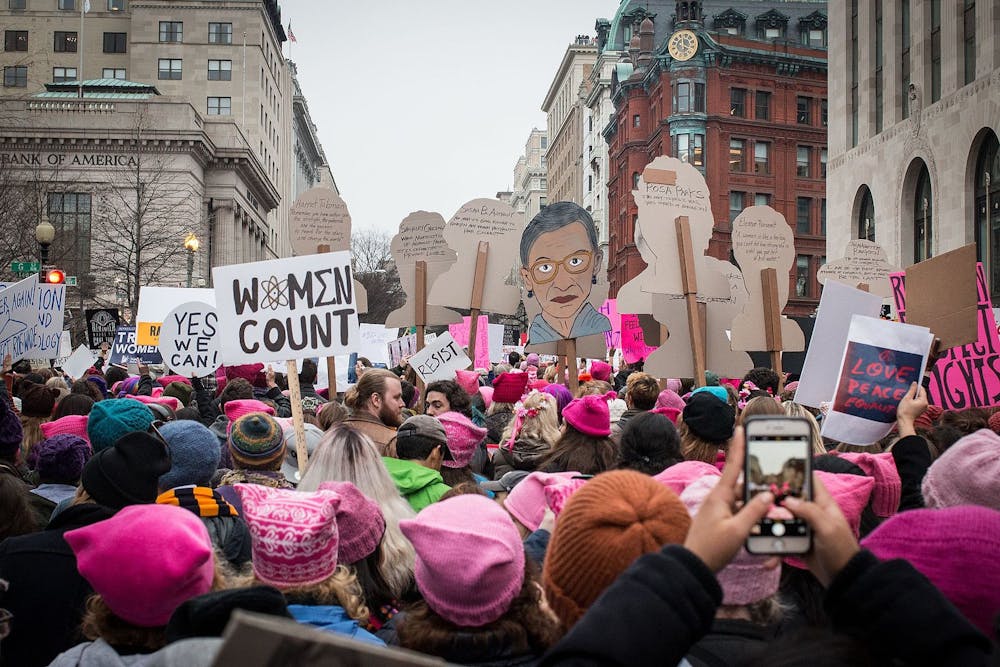The Aronson Center for International Studies held the third event in its 2020 Fall Speaker Series on Human Rights to discuss the topic of “Women and Conflict” on Thursday, Oct. 29.
Sarah Parkinson, an assistant professor of International Studies and Political Science, moderated the event. The webinar featured three guest panelists: Susan Rimmer, director of the Griffith University Policy Innovation Hub; Funmi Balogun, head of the humanitarian normative and coordination action at the United Nations Entity for Gender Equality and the Empowerment of Women; and 2011 Nobel Peace Prize Laureate Tawakkol Karman.
Sophomore Kevin LaMonica, student coordinator of the speaker series, highlighted that because much of the International Studies’ programming revolved around issues of security and foreign policy, he wanted to focus this speaker series on topics from the perspective of the global South.
LaMonica stressed that these speakers represented a variety of professional fields.
“The trifecta in the back of my mind was somebody in a non-governmental organization or civil society space, academia and someone on the ground as an activist. This event struck the trifecta,” he said.
During the panel discussion, Karman spoke of her experience with advocating for women’s rights in the peace-building process for Yemen. She described the importance of assessing the roles that women play during times of war and armed conflict.
“Being satisfied by saying that women are victims of war without paying any attention to the power of women leading societies for freedom is an act that harms women and harms peace,” she said.
Balogun implored that the public must change its perception of women as a homogenous group. She emphasized that current models of mediation must be reconstructed to take into account the agency and leadership of women.
“Spaces for mediation are designed for men and warring parties. Within those sites there is a lot of insecurity for women because these are spaces that they are traditionally not allowed in,” she said.
Rimmer described how during these processes of conflict discussion, people often put certain demands on women and question their representation. However, she countered that these questions should remain separate from the overall agenda.
“Women have the right to be at a table no matter what opinion they bring, and we don’t ask men to justify their credibility or merit,” she said.
Karman emphasized that it was crucial for women to be represented in all authority levels of the state. According to her, there is a lack of legislation giving women the constitutional right to equal representation in government, especially in countries where women are viewed in conservative and traditional roles.
She further elaborated that it should be written in the constitution that women should be given the right to be in decision-making positions. However, Karman said that oftentimes governments misuse their power and treat women in these positions as decor to help their image.
In these situations, Rimmer explained that non-governmental organizations (NGOs) were designed to support the efforts of women on the frontline by ensuring that their voices were heard, and they received appropriate funds. In Rimmer’s experience, though, this is not the case.
“[NGOs] don’t put our money where our mouth is,” she said. “All their money was taken away [when COVID-19 hit] and 60% funding cuts across the board.”
Balogun remarked that international NGOs also did not have the skill nor the capacity to properly handle situations in regions of war and armed conflict.
“Women become more at risk when they are displaced because gender norms are emphasized, and they must conform,” Balogun said.
Freshman Irene Kang wrote that she actively sought out opportunities to participate in conversations dealing with women’s rights and empowerment in an email to The News-Letter.
“I was especially interested in learning about this topic in relation to what I know about my mother’s own experience as a female U.S. Army soldier deployed to war in Afghanistan,” she wrote.
Junior Noelle Curtis wrote in an email to The News-Letter that the event presented a unique opportunity to hear how women in politics and activist groups have been shaping the global sphere.
“Each of the amazing women came from different backgrounds but being able to hear their stories in-person really put into perspective what women's empowerment and activism looked like on the global scale,“ she wrote.
Kang enjoyed the event and felt fortunate to learn from accomplished women. However, she wished that attendees had more opportunities to be involved in the discussion.
“More options for audience participation would be ideal to bring in integral social aspects of speaker events,” she wrote.
Freshman David Donald wrote in an email to The News-Letter that he appreciated the diversity among the panelists but suggested the discussion could have been formatted differently.
“I would have liked to see more interaction between the three speakers in order to create a more argumentative environment,” he wrote.
Kang’s biggest takeaway was that the international community has an important choice to make in how they approach peace-building.
“They can continue on with a framework that systematically excludes the majority of women and increases militarization, conflict and torn societies or work towards a broader consideration of women’s roles and ways to prevent conflict and gender-based violence to create peaceful, inclusive communities,” she wrote.





